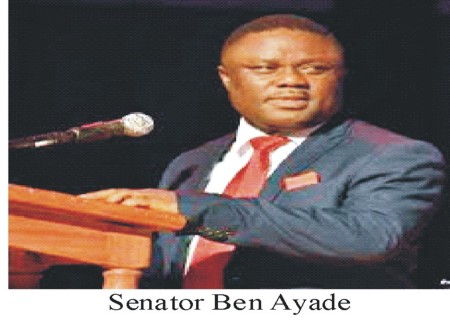By: Our correspondent
Those who rely on timber for survival may soon run out of business in Cross River State as the government has perfected plans to produce steel for roofing and thereby reduce the demand or timber.
The state governor, Ben Ayade said his administration plans to legislate against the use of wood for roofing to check deforestation, restore lost greenery and boost forest regeneration in the state.
Ayade made the disclosure when Ms Elsie Attafuah, the Senior Regional Technical Adviser, United Nations Reducing Emissions from Deforestation and Forest Degradation (UN-REDD) programme, visited him at Government House in Calabar.
The governor said: “We are in a process of enacting a new law that will prohibit the use of woods for roofing and encourage the use of steel instead.
“So, very soon when the house passes the law, we will stop roofing with woods and when this happens, the demand for timber will drop drastically.
Ayade further said:“As we speak, a company is already on ground to start production of these roofing materials to meet the needs in the industry and reduce the dependence on wood as deliberate plans to save and protect the forest.’’
The governor also urged the UN “to do away with theoretical work and be more practical in its programmes in a manner that will translate into wealth creation among Nigerians’’.
He said the state government expected the REDD programme to impact in a desired manner on the citizenry, particularly host communities, to the reserved forests across the state.
He said that in the last three years the REDD programme had focused only on training and educating people on understanding measurement analysis baselines, safeguards.
While noting that the programme was appreciable, Ayade stressed that: “ the time has come when they must reflect on the needs of the people to better their lots.’’
“REDD PLUS is a plus and so please reflect on the needs of my people. Please fast track this readiness so that we can get into the investment phase because truly, everything REDD has done is wise.
“ What they have not done is that they have not been able to put one tree on the ground, so I don’t know how you want to reduce emissions when you are not focusing on the practical aspect.
“Essentially, REDD Plus is intended to preserve the forest for the good of mankind. So, if that man that you are preserving the forest for has to die of hunger, REDD must be coming too slow.
“So, for me as a governor, a professor of Environmental Science, a lawyer, a combination of all these tells me clearly that the communities are not having a fair deal.
“ The communities are in pain and you must look into this as soon as possible. The ultimate thing is that action must be on ground,’’ he posited.
Ayade said although REDD Plus still remained a technical issue but added: “We are reducing it to the level where the local community can participate in planting, nursing and maturing trees.
“It is still a process ahead, let us fast track this process and give us a good clearance, so that people truly will enjoy the benefits of the luxury of their forest; let them finally see the reward for conserving and preserving the forest.’’
Earlier, Attafuah told the governor that she was in the state with her team to commence the implementation process of the programme.
She said the REDD programme would bring the desired benefits to the communities where the project was being carried out.
She emphasized that policy dialogue at the highest level was necessary for the smooth transition of the UN-REDD projects from strategy to implementation and solicited the support of the state for a successful transition.

